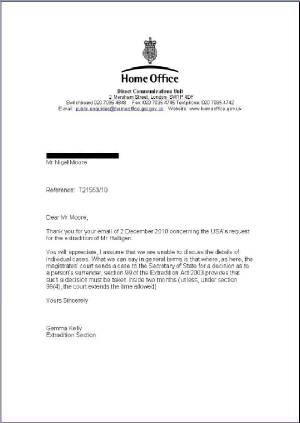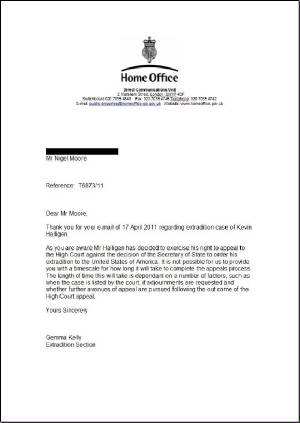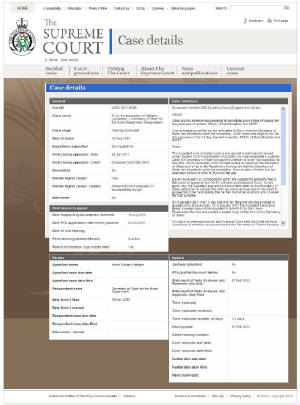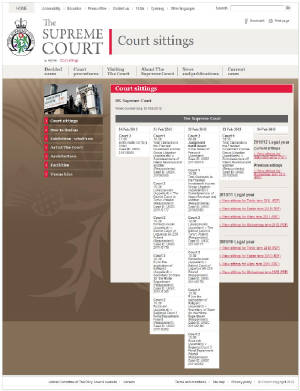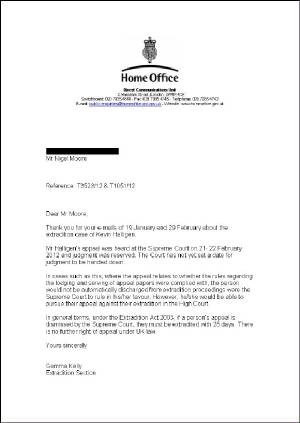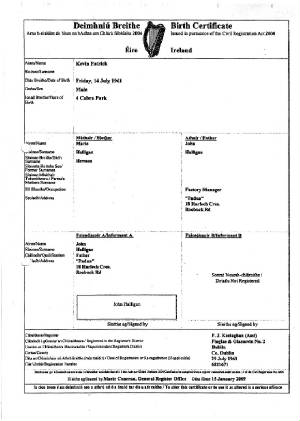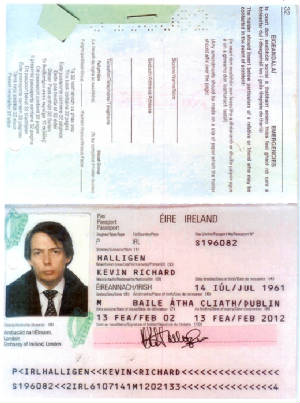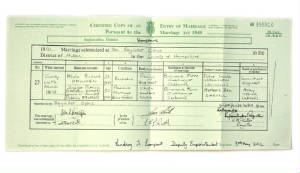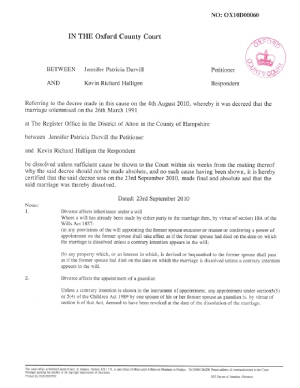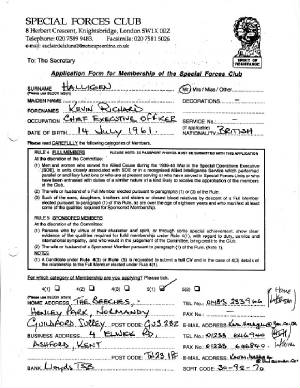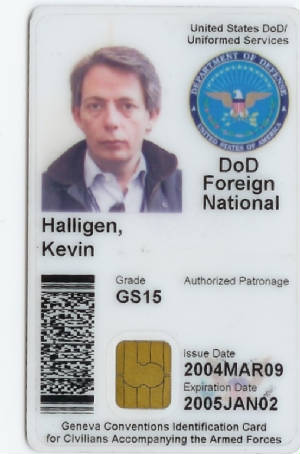Kevin Halligen was ordered to be extradited to the USA by the Home Secretary on 22nd December 2010.
On 21 June 2011, his appeal against that decision was rejected by the High Court on the grounds that he, through his
solicitors, had failed to submit a correct notice of appeal in time.
In a landmark ruling, that decision was succesfully
appealed - in a judgment handed down on 23 May 2012. Mr Halligen's case will now be referred back to the High Court.
See also:
Kevin Halligen & The Fund - 2008/2009
Maddy man on rap No2, 06 February 2010 |
Maddy man on rap No2 Daily Mirror[Headline later rewritten to: Man accused of conning £300,000
from Madeleine McCann fund wanted on 2nd scam]
6/02/2010
EXTRADITION
A man accused of conning
£300,000 from the Madeleine McCann fund will fight extradition in a separate fraud case.
Kevin Halligen,
48, is wanted in the United States after allegedly ripping off an oil company in a £1.2million scam.
His
lawyer Mark Summers told City of Westminster magistrates yesterday: "The extradition is contested." Halligen, who
appeared by videolink from prison, was remanded in custody for a further three weeks.
----------------------
Businessman
to fight US extradition order Liverpool EchoBy Staff Reporter
Feb 6 2010
A BUSINESSMAN,
whose firm helped look for Madeleine McCann, will fight extradition to the US where he is wanted over an alleged £1m
fraud.
Kevin Halligen, 48, is accused by prosecutors in America of attempting to defraud a London law firm of 2.1
million dollars.
At City of Westminster Magistrates' Court, yesterday, the Irish national's lawyer Mark
Summers confirmed that his client would contest extradition proceedings.
The brief session was adjourned to allow
time to evaluate his request for legal aid. He will next appear on February 26.
The businessman’s firm Oakley
International had been employed by Kate and Gerry McCann for around six months in 2008 to look for their missing daughter.
In all the Washington-based firm was paid around £300,000 for its services by the McCanns.
----------------------
Madeleine Fund fraud accused's court bid; Irishman fighting extradition
to US LexisNexis News
Mirror reporter
February 6, 2010 Saturday
Eire Edition, Features; pg
10
AN Irishman accused of conning EUR343,000 from the Madeleine McCann Fund will fight extradition to the
United States in connection with a separate alleged fraud, a court heard yesterday.
Kevin Halligen, 48, is wanted
in the US over a EUR1.4million scam after allegedly ripping off an oil company.
Last November, Halligen was led
away in handcuffs from the Old Bank Hotel in Oxford where he had been staying with his girlfriend under a false name.
He is suspected of swindling the Maddie fund after claiming he could use satellite technology to help find the missing girl,
although allegations relating to the McCanns are not before the court.
Further reports since his arrest have claimed
Halligen tried to squeeze another EUR189,000 out of the fund after he was sacked by the McCanns when they grew suspicious
of his credibility.
Halligen, who appeared by videolink at a brief hearing at City of Westminster Magistrates Court
in central London yesterday, was remanded in custody for a further three weeks until Friday, February 26 when a short hearing
will take place ahead of a full extradition hearing on an unspecified date.
MISSING Maddie was taken in Portugal
|
Further date set for Kevin Halligen's extradition hearing, 26 February 2010 |
|
By Keir Simmons, ITV
26 February 2010
I wasn't at the hearing for Kevin Halligen today but I understand it happened and a date for another hearing was set
- 26th March.
|
Halligen: Private detective unable to afford barrister, 26 March 2010 |
Halligen: Private detective unable to afford barrister CourtNewsUk.co.uk
26 March 2010
OXFORD; A private
detective accused of conning the McCann family of £300,000 to find their missing daughter Maddie could not afford to
be represented in court today (fri). Security consultant Kevin Halligen, 48, is fighting extradition to the United States
over claims he cheated Dutch company Trafigura out of £1.3million by offering to secure the release of their employees
from an Ivory Coast jail.
|
Mccann search businessman faces court, 22 July 2010 |
Mccann search businessman faces court The Sydney Morning Herald
July 22, 2010 - 1:14PM [UK: 04:14AM]
PAA
A businessman whose firm helped look for Madeleine McCann and who is wanted in the US over
an alleged STG1.3 million ($A2.24 million) fraud will face an extradition hearing on Thursday.
Irish national Kevin
Halligen, 48, is accused by prosecutors in America of attempting to defraud a London law firm of $US2.1 million ($A2.4 million).
The defendant's assets were frozen after his arrest on November 24.
Officers acting on a request from
US law enforcement agencies detained Halligen after finding him in a hotel in Oxford where he had been staying under an assumed
name.
The alleged crimes for which he is wanted in the US relate to money taken from a Dutch company, Trafigura,
as part of a deal to secure the release of executives under arrest in the Ivory Coast.
Instead it was spent on,
amongst other things, a mansion and a gift to his girlfriend, it is alleged.
The businessman's firm Oakley
International had been employed by Kate and Gerry McCann for about six months in 2008 to look for their missing daughter.
In all the Washington-based firm was paid around STG300,000 ($A517,687.66) for its services by the McCanns.
The extradition hearing will take place at City of Westminster Magistrates' Court.
------------------------
McCann
search businessman in court Belfast Telegraph
Thursday, 22 July 2010
An Irish businessman whose firm helped
look for Madeleine McCann and who is wanted in the US over an alleged 1.6 million euro fraud is due to face an extradition
hearing.
Irish national Kevin Halligen, 48, is accused by prosecutors in America of attempting to defraud a London
law firm of 2.1 million dollars (1.64 million euro)
The businessman's firm Oakley International had been employed
by Kate and Gerry McCann for around six months in 2008 to look for their missing daughter.
In all the Washington-based
firm was paid around 357,000 euro for its services by the McCanns.
The defendant's assets were frozen after
his arrest on November 24.
Officers acting on a request from US law enforcement agencies detained Halligen after
finding him in a hotel in Oxford where he had been staying under an assumed name.
The alleged crimes for which
he is wanted in the US relate to money taken from a Dutch company, Trafigura, as part of a deal to secure the release of executives
under arrest in the Ivory Coast.
Instead it was spent on, among other things, a mansion and a gift to his girlfriend,
it is alleged.
The extradition hearing will take place at City of Westminster Magistrates' Court.
------------------------------
McCann search businessman in court The Press Association
(UKPA) 22 July 2010
An Irish businessman whose firm helped look
for Madeleine McCann and who is wanted in the US over an alleged 1.6 million euro fraud is due to face an extradition hearing.
Irish national Kevin Halligen, 48, is accused by prosecutors in America of attempting to defraud a London law firm
of 2.1 million dollars (1.64 million euro)
The businessman's firm Oakley International had been employed by
Kate and Gerry McCann for around six months in 2008 to look for their missing daughter.
-------------------------------
KeirSimmonsITV
Twitter
23 July 2010
A UK
- US extradition hearing for Kevin Halligen whose firm helped look for Madeleine McCann did not take place yesterday - now
Aug 18.
about 15 hours ago via HootSuite
@mulene
I think they'll give you a transcript if you ask the court - but if it's the Halligen case then it didn't take
place.
about 15 hours ago via HootSuite in reply to mulene
|
Kevin Halligen remanded in custody, 18 August 2010 |
Kevin Halligen remanded in custody
By Nigel Moore
18 August 2010, 14:30pm
Statement concerning Kevin
Halligen's hearing this morning:
'Remanded in custody until 01/09/2010 at 10:00 in court City of Westminster
Magistrates' Court, Basis: in proceedings under section 2(7) of the Extradition Act 2003. Direction that live television
link be used.'
Source: City of Westminster Magistrates' Court
|
Maddie McCann investigator to get legal aid in battle against U.S. fraud charges,
29 August 2010
|
Maddie McCann investigator to get legal aid in battle against U.S. fraud charges Daily Mail
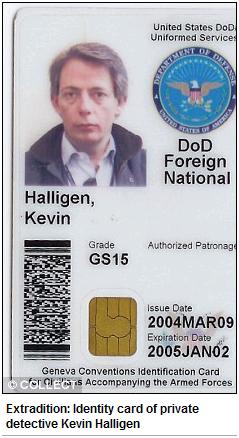
By CHRISTOPHER LEAKE and MARK HOLLINGSWORTH
Last updated at 4:16 AM
on 29th August 2010
A private detective whose firm was paid up to £500,000 from publicly donated funds
to find Madeleine McCann is to get tens of thousands of pounds in legal aid to fight extradition to the US for fraud charges.
Kevin Halligen, 50, told Kate and Gerry McCann he could find their daughter but allegedly spent the cash on a lifestyle
of first-class flights, chauffeured cars, nightclubs and luxury hotels and goods.
In a separate alleged scam he
was arrested last November at the £700-a-night Old Bank Hotel in Oxford.
US authorities issued an extradition
warrant accusing Halligen of defrauding a law firm of £1.3 million by claiming he could help free two men
jailed in war-torn Africa. It is claimed he instead spent the money on a mansion.
A document filed in the District
Court of Columbia claims he took money, saying his firm could help secure the release of two executives from the multinational
company Trafigura jailed in Ivory Coast in 2007 for allegedly dumping toxic waste.
He is said to have suggested
a rescue operation to fly in South African mercenaries, but it was cancelled. The duo were freed a few months later after
a reported £120 million payment.
Halligen, who claimed to have worked for MI5 and the CIA, linked up
with the McCanns a year after the 2007 disappearance of three-year-old Madeleine on a family holiday at Praia da Luz, Portugal.
He boasted of 'contacts' in Washington who could provide satellite imagery to help the search. Oakley International,
a company run by Halligen, was hired by the fund set up by Madeleine’s parents, but was dropped after six months due
to claims of too little progress and too much spending.
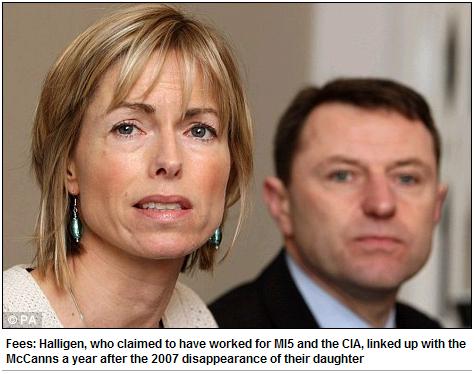
Now British taxpayers are to pay for top-flight lawyers to fight
Dublin-born Halligen's extradition. His team includes a leading extradition barrister whose fees are thought to be at
least £2,000 a day.
Additional fees for renowned London fraud solicitors Janes will boost costs even further.
The award of legal aid to Halligen, remanded at a London jail since arrest, was confirmed by Westminster magistrates
this month. His next extradition hearing is on Wednesday.
Last night a spokesman for Kate and Gerry McCann would
not comment on the case.
A spokeswoman for the Legal Services Commission said last night: 'The decision on
whether legal aid is required is made by the court.'
A Ministry of Justice spokeswoman said: 'We've
announced the start of a fundamental look at the legal aid system.'
|
Kevin Halligen remanded in custody, 01 September 2010 |
Kevin Halligen remanded in custody
By Nigel Moore
01 September 2010, 11:30am
Statement concerning Kevin Halligen's
hearing this morning:
'The case has been adjourned to 20th September 2010, 10.30am, for the full
Extradition hearing, Mr. Halligen remains in custody.'
Source: City of Westminster Magistrates' Court
|
Extradition law review to consider US-UK treaty, 08 September 2010 |
Extradition law review to consider US-UK treaty BBC News
8 September 2010 Last updated at 18:50
A review of the UK's extradition laws will consider whether the current treaty with the US is "unbalanced",
Home Secretary Theresa May has said.
Campaigners say the agreement is biased against the UK and
is being used for offences it was not intended to cover.
The year-long review will also consider the breadth of
the home secretary's discretion to intervene in cases.
It follows a series of high-profile cases, including
that of computer hacker Gary McKinnon.
The Home Office says the current extradition arrangements will continue
and the review will not impact on any cases currently under consideration.
The review panel, led by a retired Law
Lord, is expected to be finished by the end of summer 2011.
Former Home Secretary David Blunkett, who signed the
treaty, accused the current Home Secretary Theresa May of kicking the controversy "into the long grass".
Recently, he admitted he might have "given too much away" to the Americans and said sensible discussions with
the UK's partners could resolve "any irritants quite speedily".'Interests of justice'
The review will consider the operation of the Extradition Act 2003, including the European arrest warrant,
and the US/UK extradition treaty.
Home Secretary Theresa May said: "I am fully aware there are a number of
areas of the UK's extradition arrangements which have attracted controversy in recent years.
"This government
is committed to reviewing those arrangements to ensure they work both efficiently and in the interests of justice."
The European arrest warrant fast-tracks extradition between EU member states.
It means countries can ask
for extradition of an individual without providing prima-facie evidence to the courts, usually as long as the offence is a
crime in both countries and carries a prison sentence of more than one year.
Jago Russell, Fair Trials International's
chief executive, said more than one thousand people were detained and extradited by the UK in the year 2009-2010 "under
Europe's no-questions-asked extradition system".
"This review, though welcome, will only produce
a fairer system of extradition if it gets to grips with the problems caused by the European arrest warrant and if vital new
safeguards are put in place," he said.
'Rotten system'
Critics
of the US/UK treaty, agreed between Washington and London in the aftermath of the 9/11 attacks of 2001, say it is easier to
extradite people from the UK than the US.
They say the arrangement is not reciprocal because the US does not need
to present evidence to a British court to request extradition, while the UK still needs to present evidence to an American
court.
The treaty was originally designed to make it easier to bring terrorist suspects to justice but campaigners
say it is being used to seek extradition for other offences such as fraud and drug trafficking.
Conservative MP
David Davis said Mr McKinnon's case and others showed "how ill thought out" some aspects of the agreements were.
"This review should also incorporate the proposed European Investigation Order which has further scope for unintended
miscarriages of justice in which British citizens are penalised for actions which are not breaches of British law," he
said.
Shami Chakrabarti, director of civil rights group Liberty, said Britain's "rotten extradition system"
was in urgent need of an overhaul.
"No-one should be parcelled off to a foreign land without due process or
when they could be dealt with here at home - people in the UK have been vulnerable to accusation and transportation across
the globe for far too long," she said.
But shadow home secretary Alan Johnson said the European arrest warrant
has been "fundamental in helping the police return wanted criminals".
And he added that the US "is
a trusted and valued extradition partner".
"Whilst the terms of our respective legal systems are different,
the substance of the extradition tests applied in each country under the agreement are broadly the same," Mr Johnson
said.
"There is no significant evidence to suggest an imbalance.
"Again it would be surprising
if this review led to any meaningful change in the current arrangements we have with the United States."
Decision delayed
Glasgow-born Mr McKinnon, who has Asperger's syndrome, is accused of hacking into
US military computer systems.
Mr McKinnon, 43, of Wood Green, north London, does not deny hacking into systems
but insists he was seeking evidence of UFOs.
Both Prime Minister David Cameron and Deputy Prime Minister Nick Clegg
have publicly condemned plans to extradite Mr McKinnon to the US - where he faces up to 60 years in jail.
American
authorities allege that between February 2001 and March 2002, Mr McKinnon hacked into dozens of US army, navy, air force and
Department of Defense computers, as well as 16 Nasa computers.
They also say Mr McKinnon altered and deleted files
at a US naval air station not long after the 9/11 attacks.
In May, the home secretary agreed to an adjournment
of a High Court decision on whether his extradition could go ahead.
-----------------------
Analysis

Extradition treaties are a crucial tool in the state's armoury
against criminality: they give prosecutors the means to haul back wrongdoers - thereby enhancing public confidence in the
rule of law.
But the modern British system has become controversial partly because of the manner of its creation.
The current deal with the US and the separate European Arrest Warrant emerged in the post 9/11 world.
Politicians
on both sides of the Atlantic concluded that agencies needed to act more swiftly to transfer suspects - and the former British
Labour government promoted reforms with one eye on tackling the threat from international terrorism.
But critics
say the arrangements were, in effect, rushed into law and, in doing so, failed to include proper judicial safeguards against
abuse.
They point to cases like Gary Mann, convicted in Portugal of football-related violence after what he says
was an unfair trial.
Former Labour ministers stand by the deals and want to remind the new government that the
law brought one of the failed 21/7 suicide bombers to justice, after he fled to Rome.
|
Kevin Halligen's full Extradition hearing begins, 20 September 2010 |
Kevin Halligen's full Extradition hearing begins
By Nigel Moore
20 September 2010, 16:10pm
Kevin Halligen's
full Extradition hearing went ahead today; however, there is a further hearing on 3/11/10 at 10 am to finish it.
Source: City of Westminster Magistrates' Court
|
Private cop '£1.3m scam', 21 September 2010 |
Private cop '£1.3m scam' Daily Mirror
21/09/2010
Court
A private detective accused of ripping off the Madeleine McCann fund is also wanted in the US over an alleged
£1.3million fraud, it was revealed yesterday.
Kevin Halligen, 49, is being sought by the FBI for allegedly
conning UK law firm Waterson and Hicks out of the sum by claiming he could help free two staff of a client, oil company Trafigura,
jailed in the Ivory Coast over a 2006 chemical spill.
Westminster magistrates remanded Halligen, from Surrey, in
custody until November 3.
--------------------------------
Note: Headline later updated to: 'Private
detective accused of ripping off Madeleine McCann fund wanted in the US over alleged £1.3million fraud'
|
Businessman awaits Home Secretary's
decision on extradition, 04 November 2010
|
Businessman awaits Home Secretary's decision on
extradition The Press Association
Paula Fentiman
Thursday, 04 November 2010
A businessman whose firm helped look for Madeleine McCann and who is wanted
in the US over an alleged £1.3 million fraud was told today that the Home Secretary will decide whether he will be extradited.
The case of Irish national Kevin Halligen, 48, was referred to Theresa May following a hearing at City of Westminster
Magistrates' Court in London, a court spokesman said.
Halligen, who was remanded in custody, is accused by
prosecutors in America of attempting to defraud a London law firm of 2.1 million dollars (£1.32 million).
His
assets were frozen after his arrest on November 24.
Officers acting on a request from US law enforcement agencies
detained Halligen after finding him in a hotel in Oxford where he had been staying under an assumed name.
The alleged
crimes for which he is wanted in the US relate to money taken from a Dutch company, Trafigura, as part of a deal to secure
the release of executives under arrest in the Ivory Coast.
Instead it was spent on, among other things, a mansion
and a gift to his girlfriend, it is alleged.
The businessman's firm Oakley International had been employed
by Kate and Gerry McCann for around six months in 2008 to look for their missing daughter.
In all, the Washington-based
firm was paid around £300,000 for its services by the McCanns.
A Home Office spokesman said the request for
Halligen's extradition was issued on November 25 last year by the US government.
The Home Secretary now has
two months in which to make a decision.
Halligen has been remanded in custody.
|
Maddie 'investigator' awaits
extradition decision, 04 November 2010
|
Maddie 'investigator' awaits extradition decision
U.TV
Thursday, 04 November 2010
An
Irishman whose firm helped in the search for missing Madeline McCann is waiting to hear if he's to be extradited to the
US for an alleged $2.1m fraud.
Oakley International's Kevin Halligen was employed by Kate and
Gerry McCann in 2008 to look for their daughter after she went missing from an apartment in Portugal's Algarve.
The company, which is based in Washington, was paid around £300,000 for its services over a six-month period.
But it later emerged the 48-year-old businessman was wanted in America by prosecutors accusing him of attempting to defraud
a London law firm of the equivalent of £1.32m.
They claim money taken from Dutch company Trafigura, as part
of a deal to secure the release of executives under arrest in the Ivory Coast, was instead spent on purchases including a
mansion and a present for Mr Halligen's girlfriend.
He was arrested on November 24 of last year at an Oxford
hotel, where he had been staying under an assumed name, and his assets were frozen.
Following Wednesday's hearing
at City of Westminster Magistrates' Court in London, Mr Halligen was remanded in custody to await the decision of Home
Secretary Theresa May.
|
Madeleine 'swindler' on FBI
rap, 05 November 2010
|
Madeleine 'swindler' on FBI rap Daily Mirror
5/11/2010
EXTRADITION
A businessman who allegedly conned the Madeleine McCann fund out of cash is to be extradited to the US on
money laundering charges.
Kevin Halligen, 48, is accused by the FBI of a £1.2million wire fraud.
He claims to be a private investigator and had been waiting for an extradition hearing date since his arrest last November.
He is also accused of taking £300,000 from the Find Madeline fund after claiming he could use satellite technology
to find the missing girl.
Yesterday Westminster magistrates ordered his extradition. Halligen now has four weeks
to appeal.
Earlier this week, Kate McCann revealed the fund to find daughter Madeleine may have to close because
of a lack of money.
----------------------------
Note:
By Nigel Moore
05 November 2010
This report in the Daily Mirror is incorrect. Mr Halligen was remanded in custody to
await the decision of Home Secretary Theresa May. Once she makes her decision, Mr. Halligen has 14 days to appeal that decision.
Source: City of Westminster Magistrates' Court
|
Maddie 'tec boot, 05 November 2010 |
Maddie 'tec boot The
Sun (paper edition)
Friday 05 November
2010
A PRIVATE eye tracked down by The Sun after he allegedly swindled the Madeleine McCann fund out of
£3000,000 is to be extradited to America.
The FBI wants to question Dublin-born Kevin Halligen, 48, over
separate £1.2million fraud claims.
Halligen was paid out of the Find Madeleine fund after promising he could
use satellite technology to locate Maddie, who went missing aged three in Portugal in 2007.
He was arrested last
November after we found him in Oxford. Halligen has four weeks to appeal against the ruling at City of Westminster Magistrates'
Court, London.
--------------------------------
Note:
By Nigel Moore
05
November 2010
This report in The Sun is incorrect. Mr Halligen was remanded in custody to await the
decision of Home Secretary Theresa May. Once she makes her decision, Mr. Halligen has 14 days to appeal that decision.
Source: City of Westminster Magistrates' Court
|
Home Office response, concerning extradition
decision for Kevin Halligen, 20 December 2010
|
|
Home Office response, concerning extradition
decision for Kevin Halligen
Received by email, Monday 20 December 2010
Home Office
Direct Communications Unit
2 Marsham Street,
London
SW1P 4DF
Dear Mr Moore,
Thank you for your email of 2 December 2010 concerning the USA's request
for the extradition of Mr Halligen.
You will appreciate, I assume that we are unable to discuss the details of
individual cases. What we can say in general terms is that where, as here, the magistrates' court sends a case to the
Secretary of State for a decision as to a person's surrender, section 99 of the Extradition Act 2003 provides that such
a decision must be taken inside two months (unless, under section 99(4), the court extends the time allowed)
Yours
Sincerely
Gemma Kelly
Extradition Section
|
Kevin Halligen appealing against Extradition order, 10 January 2011 |
Kevin Halligen appealing against Extradition order
By Nigel Moore
10 January 2011, 13:30pm
Kevin Halligen was ordered
to be Extradited to the USA by the Home Secretary on 22nd December, however, he is now appealing that decision at the High
Court.
Source: City of Westminster Magistrates' Court
|
Kevin Halligen – Extradition Proceeding, Jan/Feb 2011 |
|
January/February 2011
Carter Moore represent
Kevin Halligen in extradition proceedings brought by The United States of America. The USA have requested that Mr Halligen
be extradited there in order for him to be tried there on allegations which he vehemently denies. Jeremy Moore, head of the
criminal defence team at Carter Moore Solicitors, is appealing these extradition proceedings in the High Court.
|
Home Office response, concerning extradition
appeal by Kevin Halligen, 20 May 2011
|
|
Home Office response, concerning extradition appeal
by Kevin Halligen
Received by email, Friday 20 May 2011
Home
Office
Direct Communications Unit
2 Marsham Street,
London
SW1P 4DF
Dear Mr Moore,
Thank you for your e-mail of 17 April 2011 regarding extradition case of Kevin Halligen.
As you are aware Mr Halligen has decided to exercise his right to appeal to the High Court against the decision of the Secretary
of State to order his extradition to the United States of America. It is not possible for us to provide you with a timescale
for how long it will take to complete the appeals process. The length of time this will take is dependant on a number of factors,
such as when the case is listed by the court, if adjournments are requested and whether further avenues of appeal are pursued
following the out come of the High Court appeal.
Yours Sincerely
Gemma Kelly
Extradition Section
|
Halligen v Secretary of State for the Home Department [2011], 21 June 2011 |
Halligen v Secretary of State for the Home Department [2011] BAILII
Jun 21 2011
| Neutral
Citation Number: [2011] EWHC 1584 (Admin) |
| Case No: CO/135253/2010 |
IN
THE HIGH COURT OF JUSTICE
QUEEN'S BENCH DIVISION
ADMINISTRATIVE COURT
Royal Courts of Justice
Strand, London, WC2A 2LL |
| 21/06/2011 |
B e f o r e : LORD JUSTICE LAWS
AND MR. JUSTICE STADLEN
____________________ Between:
Kevin Richard Halligen
|
Appellant
|
- and -
|
|
Secretary of State for the Home Department
-and-
Government of the United States of America
|
Respondent
Interested Party
|
____________________ Mr Stephen Vullo and
Mr David Patience (instructed by Carter Moore Solicitors) for the Appellant
Mr Ben Watson (instructed by Treasury Solicitors)
for the Respondent
Mr Ben Lloyd (instructed by The Crown Prosecution Service) for the Interested Party
Hearing date:
19th April 2011
____________________ HTML VERSION OF JUDGMENT
____________________ Crown
Copyright © The Hon. Mr. Justice Stadlen
- There is before the Court a preliminary issue in an appeal by the Appellant, Kevin Halligen, against a decision by the Secretary
of State for the Home Department made on 22 December 2010 to order his extradition to the USA. The preliminary issue is whether
the court has jurisdiction to entertain the appeal or whether, as contended by the Respondent, the Secretary of State, and
the Interested Party, the Government of the United States of America, the appeal is statute barred. The appeal came on the
papers on 1 March 2011 before Pill LJ sitting in the Divisional Court and he ordered that there be a hearing on this preliminary
issue.
- The principal question on which this preliminary issue turns is whether the requirements as to service of the notice of appeal,
with which on its face the Appellant accepts that he did not comply, should nonetheless on the facts of this case be taken
as having been complied with.
- The relevant chronology is as follows:
(i) On 22 December 2010 the Secretary of State notified the Appellant of her
decision to order his extradition under the provisions of Part 2 of the Extradition Act 2003 ("the 2003 Act"). (ii)
The notification was contained in a decision letter from Julian Gibbs, an official at the extradition section of the judicial
co-operation unit of the respondent, which, together with a copy of extradition order, was faxed to the Appellant's former
solicitors, Janes Solicitors by Gemma Kelly, another official in the extradition unit. It is not clear whether the fax was
sent at 1548pm or 1648pm. (iii) That letter contained details of the notice of appeal requirements under the 2003 Act
including the need to file and serve any notice of appeal within fourteen days, starting on the day on which the Secretary
of State notifies her decision. It also referred him to the Practice Direction supplementing Part 52 of the Civil Procedure
Rules governing extradition appeals and the need to serve any notice of appeal on the Crown Prosecution Service (on behalf
of the Government of the United States who had sought the extradition order) as well as on the Home Office. The letter concluded:
"We should therefore be obliged if you would notify Gemma Kelly here at the Home Office as to whether there is to be
an appeal; and in that event, if you would comply with the Practice Direction"; (iv) on 29 December 2010 the Appellant's
former solicitors filed a notice of appeal on the proper form at court; (v) on the same day the Appellant wrote a handwritten
letter to Mr. Gibbs and Ms Kelly, addressed to Ms Kelly, in response to Ms Kelly's fax and Mr.Gibbs' letter, inviting
her to treat his letter as notice and service of his intent to appeal. The letter contained the Appellant's name and address
at HM Prison Wandsworth. It referred to a request by the United States of America for his extradition with a reference number.
The letter acknowledged receipt of Ms Kelly's fax of the same date containing the letter from Mr. Gibbs and the decision
to proceed with his extradition. It continued: "Given the timing of receipt of the fax and letter and the extended holiday
period, please accept this letter as notice and service of my intent to appeal that decision. My solicitors and counsel have
been duly instructed and this letter is only necessitated by the imposed due date of 4 January 2011 and my inability to make
contact with them given the restrictions imposed by HMP Wandsworth. Please confirm receipt of this letter as soon as possible
to me at the above details. Yours Sincerely, K. Halligen." (vi) On 4 January 2011 the deadline for serving the
notice of appeal expired; (vii) on 5 January 2011 the Appellant's former solicitors faxed to the Crown Prosecution
Service, on behalf of the Interested Party, a copy of the sealed Notice of Appeal which had been filed at the court on 29
December 2010. Prima facie this was out of time. (viii) On 6 January 2011 the Secretary of State was also served with
notice of the Appellant's appeal. The documents had been sent by post the previous day by the Appellant's former solicitors.
Again on its face this also was out of time.
Legal Framework - Section 108 of the 2003 Act provides:
"(1) If the Secretary of State orders a person's extradition
under this Part,the person may appeal to the High Court against the order......
(4) Notice of an appeal under this
section must be given in accordance with the rules of court before the end of the permitted period, which is fourteen days
starting with the day of which the Secretary of State informs the person of the order under sectioN100(1)." - CPR part 52.2 provides that:
"All parties to an appeal must comply with practice direction 52." - Practice direction 52, paragraph 22.6A(7) provides:
"Where an appeal is brought under section 108 of
the Act the Appellant's notice must be filed and served before the expiry of the 14 days starting with the day on which
the Secretary of State informs the person that he has ordered his extradition." - Practice direction 52, paragraph 22.6A(12) provides:
"Where an appeal is brought under section 103,
105, 108 or 110 of the Act the appellant must serve a copy of the appellant's notice on –
(a) the Crown
Prosecution Service; and (b) the Home Office, if they are not a party to the appeal, in addition to the persons to be
to be served under rule 52.4(3) and in accordance with that rule." - CPR 52.4(3) provides;
"Subject to paragraph (4) and unless the appeal court orders otherwise, an Appellant's
notice must be served on each respondent-
(a) as soon as practicable; (b) in any event, not later than seven
days after it is filed." - It is accepted on behalf of the appellant that the decision in Mucelli v Government of Albania and Moulai v Deputy Prosecutor
in Creteil, France [2009] 1 WLR 276 is authority for the proposition that giving notice, for the purposes of the statutory appeals process under Part 2 of the
2003 Act, entails both filing and serving notice of appeal and that the fourteen day permitted period for giving notice cannot
be extended by the Court invoking its powers under the Civil Procedure Rules ('CPR'). The provision with which the
House of Lords was concerned was Section 26 of the 2003 Act.
- Section 26 of the 2003 Act provides as follows:
"Appeal against extradition order (1)
If the appropriate judge orders a person's extradition under this Part, the person may appeal to the High Court against
the order...... (4) Notice of appeal under this section must be given in accordance the with the rules of the court
before the end of the permitted period, which is 7 days starting on the day the order is made. - It will be observed that the critical language in section 108(4) is the same as that in section 26(4): "Notice of appeal
under this section must be given in accordance with rules of court before the end of the permitted period". The difference
is that in section 26 the end period is 7 days starting with the day on which the order sought to be appealed is made, whereas
in section 108 it is fourteen days starting with the day on which the Secretary of State informs the person of the order under
section 100(1). This reflects the fact that under section 26 appeal lies against an order of the judge, whereas under section
108 it lies against an order of the Secretary of State who has ordered his extradition.
- In Mucelli v Government of Albania Lord Brown of Eaton-under-Heywood identified what he described as the two
core questions at the heart of the two appeals in that case as being:
"(i) what is meant by the requirement
that notice is 'given' – does that mean merely filed with the court or both filed with the court and served
on the Respondent?;
(ii) secondly, whichever is meant, is such judicial discretion as is ordinarily available under
the rules of court - variously to extend time for compliance with any rule (CPR r.3.1(2)(a), to vary the time-limit for filing
an appeal under notice (rule 52.6(1), to dispense with service (rule 6.9), or perhaps more generally to remedy errors (rule
3.10) – available in this context to overcome any failure to give notice within the specified time?"(Paragraph
32). - In both Moulai and Mucelli the notice of the proposed appeal was filed with the court within the specified
time. The only issue was whether the notice of appeal in each case had been served within the specified time limit.
- Lord Brown, with whose speech Lord Carswell agreed, concluded that section 26(4) (the analogous provision in the Part 1 of
the 2003 Act) required the notice of any appeal to be both filed and served within the stipulated seven-day period and that
being a statutory time limit this could not be extended. Accordingly, the court's ordinarily procedural powers set out
in the CPR would only operate insofar as would be consistent with the filing and serving of the notice before the statutory
time limit expired.
"Against this background it seems to me tolerably plain both that section 26(4)
is requiring the notice of any appeal to be both filed and served within the stipulated seven day period and that this, being
a statutory time limit, is unextendable. The rules of court are to dictate everything about the filing and serving of the
notice save only the period within which this must be done; this is expressly dictated by the section itself. Whatever discretions
arise under the rules are exercisable only in so far as is consistent with the filing and serving of the notice before the
statutory time limit expires." (Paragraph 38). - Lord Neuberger of Abbotsbury, with whose speech Lord Phillips of Worth Matravers, Lord Carswell and Lord Brown agreed, also
concluded that an Appellant's notice must be served, as well as filed, within the seven day period referred to in section
26(4):
" 73. The second question of principle is whether there is any basis on which the court could
extend time for filing or service under sections 26(4) and 103(9). Again, I shall deal first with the position under section
26.
74. On the face of it, at any rate, there is a clear and unqualified statutory time-limit, namely seven days,
and there would therefore seem to be no basis upon which it could be extended. In that connection, viewed from the English
and Welsh perspective, I would refer to the Civil Procedure Rules, which contain provisions whereby the court can extend time
for the taking of any step, under CPR r 3.1(2)(a), can make an order remedying any error of procedure, under CPR r 3.10, or
can make an order dispensing with service of documents under CPR r 6.9. However, these powers cannot be invoked to extend
a statutory time-limit or to avoid service required by statute, unless of course, the statute so provides. Apart from being
correct as a matter of principle, this conclusion follows from CPR r 3.2 (a) which refers to the time limits in "any
rule, practice directions or court order", and from CPR r 6.1 (a) [which] states that the rules in CPR Pt 6 apply, "except
where….any other enactment… makes a different provision". 75 Accordingly, it would be necessary to
find some statutory basis for the court having power to extend time, or indeed to dispense with the service which section
26(4) requires. The only arguable such basis is to be found in the words "in accordance with rules of court", which,
it is contended, incorporate the various provisions of the CPR to which I have just referred. I cannot accept that argument.
First, the way in which the subsection is linguistically structured appears to me to mean that those words govern the way
in which "notice of an appeal" is to be "given", not the time within which such notice is to be given,
which is dictated by the closing part of the subsection.... 78 It is true that the Practice Direction to CPR Pt 5.2,
and the prescribed form of the notice of appeal both suggest that the court's powers to extend time under the CPR apply
to the appeal process. As a general proposition this is of course, true, but it does not follow that the draftsman of those
documents considered, let alone was stating, that the court must have such power in relation to every type of appeal. In any
event, CPR r 52.1 (4) makes it clear that the provisions of CPR Pt 52 are "subject to any rule, enactment or practice
direction which sets out special provisions with regard to any particular category of appeal", and the practice direction
is brought into effect through CPR r 52.2. 79 The Divisional Court in the Moulai appeal thought that the court
could none the less dispense with service of the appeal notice under CPR r 6.9 (although they declined to make such an order
in the event). I do not agree. If, as I have concluded section 26 (4) requires the appellant's notice to be filed and
served within seven days, the court can no more make an order dispensing with service than it can extend the time. This conclusion
arrived at in a case where the dispensing of service is being sought to avoid having to serve at all or to avoid the seven
day time limit, does not preclude the possibility of the court making an order for substituted service in appropriate cases
under the 2003 Act. Indeed, on exceptional facts (e.g. where the respondent was evading service), the court might well order
that service could be affected in a way that may well lead to the notice not being received by the respondent within the seven
day period, or even – conceivably – at all. 80 For these reasons, I consider that it is not open to the
court to extend time under section 26(4) or to dispense with service of the notice of appeal. For the same reasons, I reach
the same conclusion in relation to section 103(9)." - The Secretary of State relying on the decision of the House of Lords in Mucelli submits that the court has no grounds
to entertain an appeal no notice of appeal having been given within the fourteen day period prescribed by section 108 of the
2003 Act and the court having no power under the CPR to waive or abridge the strict requirement imposed by section 108(4).
- On behalf of the appellant Mr. Vullo (in writing) and Mr. Patience advanced two principal submissions.
- First reliance was placed on the hand written letter sent by the appellant to Ms Kelly dated 29 December 2010. This letter
it was submitted should be deemed to constitute valid service of his appellant's notice on the Secretary of State within
the statutory time frame. Although the form of the notice was deficient, that was a deficiency which went merely to the form
of the notice or the manner In which notice was given so that the decision in Mucelli did not preclude the court
from exercising its powers under CPR rule 4(2) or rule 3(10) to remedy the deficiency. All that was prevented by the decision
Mucelli from being remedied by the court's powers under the CPR is the time within which notice of an appeal is given,
not the manner in which it is given.
- Mr Patience submitted that the appellant's letter dated 29 December 2010 purported to be service of the appellants Notice
of Appeal and that its deficiency related to the form of the notice of appeal not to the timing of its service on the Secretary
of State such that the power of the court to forgive the deficiency under one or other of the rules of the CPR is not precluded
by the decision of the House of Lords in Mucelli.
- In support of this submission he relied on the decision of Collins J in Kane v Spain [2011] EWHC 824 (Admin). He submitted that that decision supported the proposition that the 2003 Act does not require service within the statutory
period of the sealed notice of appeal which has already been filed with the court, but merely service of a draft copy of the
notice of appeal.
- This is an issue on which there have been conflicting decisions in the Divisional Court and the Administration court. In Poland
v Walerianczyk [2010] EWHC 2149 (Admin) Stanley Burnton LJ and Nicol J held that service of a draft Notice of Appeal followed by the filing of the Notice of Appeal
itself is not capable of complying with the requirement that Notice of Appeal be given within the permitted period. In Kane
v Spain Collins J declined to follow the decision in Poland, holding that section 26(4) of the 2003 Act does
not require that service of the Notice of Appeal on the Respondent must post date its filing in the court (see paragraph 50).
- In my judgment the decision of Collins J in Kane v Spain does not assist the Appellant and it is not necessary for
the purposes of deciding this preliminary issue to embark on a detailed comparative analysis of the judgment in that case
and the Walerianczyk case. In Kane v Spain itself the document on which reliance was placed for the purposes
of satisfying the requirements of section 26(4) was a copy of the completed form N161 Notice of Appeal which may have been
served by fax shortly before the original was filed at court. Thereafter the first page only of the sealed Notice of Appeal
was served by fax. Collins J held that service of the unsealed copy of the Notice of Appeal prior to its having been filed
complied with section 26(4).
- In support of his conclusions Collins J stated:
"19. What matters for the purpose of giving the necessary
information, as is made clear by what Lord Justice Stanley Burnton said in paragraph 14, is that the respondent should know
that an appeal is being pursued." - He went on to say:
"22. It follows, as it seems to me from that, that a notice of appeal simply means
what it says, namely that the individual has filled out the relevant form or document and has indicated on that that he is
appealing. He must, of course, file it and he must serve a copy of it on the Crown Prosecution Service. But it does not follow
– and in my judgment cannot follow – that it is necessary for the filing in the court to come before the service
on the respondent. The respondent will know that it is said that he has filed a notice of appeal and thus the notice of appeal
is pending....." 38. It follows, as it seems to me, also from that that the distinction that
is sought to be drawn between a notice and a draft notice, is one which cannot be relevant or appropriate in the circumstances
of an extradition appeal such as this. The notice is a notice of appeal. It does not matter that it has not yet been filed
in court. True, I suppose, that it is possible that there may be variations. But those variations would only be in the contents
of the notice. The fact that there is an appeal and that appeal is being commenced cannot be changed. That is the only fact
that is essential for the purposes of the proper commencement of an appeal. Any failure to comply with the rules and what
is contained in that notice – for example, grounds – can be dealt with by the court by making orders to require
compliance because they are procedural irregularities which can be cured through CPR 3.10.
39. Thus I would construe
the notice of appeal in section 26(4) to mean no more than notice that an appeal is being brought, not necessarily to extend
to the grounds or the other contents of that notice. It seems to me at any other construction would mean that the full period
of seven days was not given to an appellant." - In this case, what was served by the appellant was not a notice of appeal and, unlike the document which was served in Kane
v Spain, did not purport to be a draft Notice of Appeal. The letter dated 29th December did not purport to give notice
that an appeal had been filed or commenced or even that it was being filed or commenced. There was no reference to the fact
that in fact a Notice of Appeal was going to be or had been filed that day. Rather what it gave notice of was merely the appellant's
intention to appeal to which end he indicated that he had instructed solicitors and counsel. In my judgment
that cannot be said to constitute a notice of appeal or even a draft notice of appeal. Thus even if Collins J in Kane
v Spain is right that service of a draft notice of appeal within time but prior to the filing of the Notice of Appeal
at court is capable of satisfying the requirements of section 108(4) or section 26(4) and this court in Walerianczyk
was wrong that it is not, that would not avail the appellant in this case. There was here no service on 29 December of even
a draft notice of appeal or indeed anything that would satisfy even Collins J's description of the relevant form or document
on which the individual has indicated that he is appealing.
- Further support for this view is to be found in the recent decision of this court in the case of Szelagowski v Regional Court
of Piotrkow Trybunalski Poland [2011] EWHC 1033 (Admin). In that case Collins J. clarified that in his decision in Kane v Spain he did not intend to indicate that there
could be compliance with the provisions of Section 26(4) or 28(4) by serving anything other than a document which, on its
face, stated that it was a notice of appeal. "The document which gave notification that an appeal was to be or had been
lodged would not suffice." (Paragraph 20)
- In the leading judgment with which Collins J. agreed Sullivan LJ rejected a submission that it is sufficient in order to give
notice of an appeal that the Respondent was given a document which made it plain that there was a notice of appeal and which
told the Respondent what the reference number of that appeal was. "It is plain, in my judgment, from the decision in
Mucelli that was is required for the purpose of service is, at the very least, service of a document that can be
said to be a notice of appeal (see for example the speech of Lord Brown at paragraph 38)." (Paragraph 15).
In
that case an employee of the Appellant's then solicitors filed a notice of appeal with the Administrative Court Office
(ACO) and then served on the Crown Prosecution Service a bundle which was supposed to include a copy of the Appellant's
notice. By error in fact he served only the covering letter which stated (incorrectly): "Please find enclosed the appeal
bundle containing the following: Appellant's notice…….."
- Sullivan LJ held that, as was accepted by Counsel for the Appellant, the covering letter did not purport to be and was not
itself capable of being regarded as a notice of appeal even though it referred to the existence of a notice of appeal and
grounds of appeal: "A letter which tells the reader that there is a notice of appeal is not itself that notice of appeal
for the purposes of Section 26(4). It merely tells the reader that there is another document which is such a notice. (Paragraph
14).
- Sullivan LJ pointed out that it was a common feature of all the cases to which he had referred in his judgment (which included
Mucelli, Poland v Walerianczyk and Kane v Spain) there was a document served which could be said to be a notice of
appeal. He went on to say: "However if that is not right and all that was needed was that the appellant should provide
a letter in effect saying "I have appealed and the reference number of my appeal is such and such" even that requirement
was not, on the facts of this case, complied with. That is because the letter that was left with the Respondent did not include
the Administrative Court reference number. (Paragraph 16). That was the case even though the CPS representative on whom the
appeal bundle was served had been shown a letter including the Administrative Court reference number which was then taken
away from her by the employee of the Appellant's solicitors: "Thus the CPS was not even given, save for the briefest
of glances, an Administrative Court reference number for the appeal. Therefore, even if the assumption that I am for the present
purposes to make in favour of the appellant that something that can be called a notice of appeal must be served on the Respondent,
is too onerous, there is nothing given to the Respondent which gave it even the most basic information such as the Administrative
Court reference number of the appeal that had been filed. It follows in my view that that there was no document which was
capable of being described as a notice of appeal serviced upon the Respondent within the seven day period. If there is no
such document then there is nothing in the CPR which can avail the Appellant. It follows that this court, in my view, does
not have jurisdiction to consider this appeal." (Paragraph 16 & 17).
- Collins J and Treacy J agreed with Sullivan LJ that the court had no jurisdiction in the matter, Collins J stating that he
entirely agreed with Sullivan LJ's judgment.
- The facts in Szelagowski were extreme, as Sullivan LJ emphasised. The Appellant in that case was blameless. There was no doubt
that he intended to appeal and there was equally no doubt that on receipt of the covering letter the Respondent knew that
the Appellant wished to appeal. The fact that the court was nonetheless driven to the unanimous conclusion that it had no
jurisdiction to entertain the appeal demonstrated as Sullivan LJ emphasised "How a rigid statutory time limit which cannot
be extended under any circumstances can work injustice in practice, but the statutory scheme is very clear." (Paragraph
18). I would with respect agree with that observation. The facts of this case are somewhat less extreme in that the letter
relied did not refer to an existing notice of appeal and in terms was merely the expression of an intention to appeal. It
was nonetheless clear from the letter that the Appellant did indeed intend to appeal that he had instructed solicitors and
counsel to that end, that he was conscious of the statutory time limit and concerned to comply with it and conscious of his
dependence on the conduct of his legal advisors, which was beyond his control, to comply with the statutory time limit. There
was no evidence before us as to why service of the notice of appeal by the Appellant's former solicitors on the Respondent
and the CPS was not effected until respectively 5th and 6th January 2011, that is to say respectively
one and two days outside the fourteen day time limit. However, there was no suggestion that this was the fault of the Appellant.
It would seem to offend basic principles of fairness that a person served with a notice of extradition should be deprived
of a statutory right of appeal through no fault of his own.
- The Appellant advanced an alternative submission based on CPR rule 6.26 which provides as follows:
"6.26
deemed Service
A document, other than a claim form, served within the United Kingdom in accordance with these Rules
or any relevant practice directions is deemed to be served on the day shown in the following table….. 4. fax –
if the transmission of the fax is completed on a business day before 4.30pm, on that day; or in any other case, on the next
business day after the day on which it was transmitted." The Appellant submitted that on the basis
that the faxed notification of the Secretary of State's decision to extradite was not sent until 1648pm on 22 December
2010 the effect of CPR Rule 6.26 is that the notification was deemed to have been sent on 23 December 2010 with the consequence
that the fourteen day permitted period in which the Appellant was required to give notice of Appeal did not commence until
23 December 2010. Therefore it was submitted the sealed copy of the Appellant's notice which was faxed to the CPS on 5
January 2011 constituted valid service with the statutory fourteen day time frame. - Mr. Patience referred to a number of authorities for the purpose of submitting that none of them constitutes binding authority
requiring this court to reject the Appellant's alternative submission. It is in my judgment unnecessary to refer to those
authorities. That is because it is, in my judgment, clear beyond argument that Rule 6.26 has no application to the fax by
which the Secretary of State informed the Appellant of the order that he be extradited.
- It is true that Section 100(4) of the 2003 Act defines the permitted period before the end of which notice of an appeal under
that section must be given as "fourteen days starting with the date on which the Secretary of State informs the person
of the order under Section 100(1)." However, it does not follow from that that the document by which the Secretary of
State informs the extradited person of the order she has made is a document served "in accordance with these Rules or
any relevant practice directions" within the meaning of CPR Rule 6.26. The CPR lays down no Rule or practice direction
governing the means by which the Secretary of State is to inform a person that she has made an extradition order under Section
100(1) of the 2003 Act.
- There is thus no mechanism by which Rule 6.26 is engaged so far as concerns the fax dated 22 December 2010. I would observe
that in any event it is not clear to me how this submission could have availed the Appellant given the acknowledgment by Mr.
Patience that it is not clear whether the fax was in fact sent at 1548pm, in which case even if Rule 6.26 did apply it would
be treated as having been served on 22 December 2010, or 1648pm. Moreover even if the fourteen day period began on 23 December
2010 it was not suggested by Mr. Patience that the service on the Secretary of State on 6 January 2011 which was one of the
requirements as to service laid down by a combination of Section 108(4) and practice direction 52.120, paragraph 26.6A(12),
would have been within the fourteen day period.
- In their written submissions Mr. Vullo and Mr. Patience submitted that support was lent to their two main submissions by the
obligation of the court under Section 3 of the Human Rights Act 1998 to interpret and apply primary and secondary legislation
in a manner compatible within the Appellant's Conventions rights. Were the court to apply the CPR in any other way, and
thus to rule that there had been no valid service, it would be forced so the argument went to conclude that his previous solicitors
had not provided him with effective legal assistance. Having reached such a conclusion to deny him his right of appeal because
of the errors of his solicitors would effectively to deny the Appellant his rights under Article 6 of the Convention, in that
he would have been denied a fair hearing and in addition denied legal assistance in the Appellate process. In effect legal
assistance does not, it was submitted, constitute legal assistance for the purposes of Article 6 of the Convention.
- In oral argument Mr. Patience clarified that the submission was intended to argue that in considering whether to exercise
its power under CPR Rule 3.10 to rectify matters where there has been an error of procedure the court is bound by Section
3 of the Human Rights Act to construe Rule 3.10 in such a way as to require it to remedy the defective service of the Appellant's
notice of appeal. In my judgment this submission fails at the preliminary hurdle. For the reasons given by the House of Lords
in Mucelli the court has no jurisdiction to waive or amend the requirement as to service laid down by Section 108(4)
of the 2003 Act. No question of exercising any discretion under Rule 3.10 arises.
- Nor can I accept the Appellant's alternative submission that Section 3 of the Human Rights Act requires the court to interpret
Section 108(4) of the 2003 Act as defining the giving of notice of appeal so as to include giving notice of intention to appeal.
Such a construction is not in my judgment necessary to render Section 108(4) compatible with Article 6 Convention rights of
persons informed that the Secretary of State has made an order for their extradition.
- In further alternative it was submitted on behalf of the Appellant that to give practical effect to his Article 6 rights Section
3 of the Human Rights Act requires the court to interpret Section 108(4) of the 2003 Act in such a manner as to invoke its
residual common law discretion (as envisaged in Mucelli at paragraph 83-85) to allow service outside the statutory
time limit. In my judgment that submission proceeds on a misunderstanding of what Lord Neuberger stated in Mucelli.
He was dealing in paragraph 83-85 with the question how the statutory time limit should be applied in circumstances where
it is impossible to give notice on or during the final part of the last day of the relevant prescribed period. He was not
thereby suggesting that the court retains a common law discretion to waive or extend the statutory period prescribed by Section
108(4) or Section 26(4) rather he was applying the relevant statutory time period to the facts of a hypothetical case where
service on part of the last day was impossible because the Respondent's office was closed. There is no basis for suggesting
that Section 3 of the Human Rights Act requires the court to apply the statutory fourteen day time period to the facts of
this case so as to render the last day for service the 5th rather that 4th January 2011.
Conclusion - For these reasons in my judgment the answer to the preliminary issue order by Pill LJ is that the court has no jurisdiction
to entertain the Appellant's appeal.
Lord Justice Laws: I agree.
|
Madeleine McCann detective loses appeal against extradition, 21 June 2011 |
Madeleine McCann detective loses appeal against extradition Liverpool Echo
Jun 21 2011
A BUSINESSMAN whose firm helped look for Madeleine McCann
has failed in a last ditch High Court bid to escape extradition over an alleged £1.3m fraud.
Kevin Halligen
is now set to stand trial in the US accused of defrauding a London law firm.
It is claimed he took the money to
secure the release of Dutch business executives arrested in the Ivory Coast but instead spent it on a mansion.
The
49-year-old's company, Oakley International, was employed in 2008 by Allerton-born Kate and Gerry McCann to find their
three-year-old daughter, who disappeared in Praia da Luz, Portugal, in 2007.
But after six months, his contract
was cancelled by the Find Madeleine Fund after he delivered little to the investigation.
Halligen, whose firm was
based in Washington, was arrested in 2009 after months spent evading police.
He was found staying at the plush
Old Bank hotel in Oxfordshire, where he was known under a number of aliases.
Halligen would spend most of his evenings
getting drunk in the bar, witnesses said, and caused consternation over unpaid bills.
In December last year, Home
Secretary Theresa May ordered his extradition to stand trial in America, but lawyers for Halligen challenged the move at London's
High Court.
However, his case fell at the first hurdle yesterday when top judges ruled he had left it too late
to lodge an appeal against the extradition order.
They also dismissed claims that the tight time limit violated
his human rights.
Mr Justice Stadlen concluded: "The court has no jurisdiction to entertain Mr Halligen's
appeal."
Kate McCann this month said she was confident that her daughter can be traced after Scotland Yard
was called in to review the investigation.
|
Call for overhaul of UK extradition rules, 22 June 2011 |
|
"Any changes to our extradition procedure should take place without delay."
- Michael
Caplan, from solicitors Kingsley Napley
|
|
Call for overhaul of UK extradition rules BBC News
22 June 2011 Last updated at 01:56
The UK's extradition arrangements with the US and the EU must be overhauled to better protect rights of individuals,
a committee of MPs and peers is arguing.
It said safeguards in US cases were "inadequate",
more evidence was needed to justify requests and judges should be able to refuse them if they were not in the "interests
of justice".
High-profile extradition cases, such as that of computer hacker Gary McKinnon, have fuelled demands
for a reappraisal.
Ministers are reviewing current rules.
Home Secretary Theresa May ordered the review
last year to determine whether the UK's extradition arrangements with the US - in place since 2003 - were "balanced"
following a spate of controversial cases.
In a new report, the cross-party Joint Committee on Human Rights said tougher safeguards were needed to ensure individuals' rights to a fair trial and to protect their private and family
lives.
Evidence based
It has called for the the 2003 US-UK Treaty to be "urgently
renegotiated" to enable the government to refuse extradition requests if UK prosecutors have decided against beginning
proceedings at home.
Requests should only be considered if the US authorities provide prima facie evidence that
the suspect has a case to answer to prevent people being sent to face trial abroad on "speculative charges", it
says.
Although provisions already exist for judges to deny extradition if an alleged offence took place wholly
or legally in the UK, the committee said these were not being put into practice.
The committee also calls for the
government to renegotiate the terms of the European Arrest Warrant, which came into force in the UK in 2004 to speed up extradition
requests between EU member states.
It says there are "serious problems" with how the system is operating,
that some warrants have been issued disproportionately and for relatively minor offences.
The BBC's home affairs
correspondent Danny Shaw said the committee believed judges did not have enough discretion about how to act in such cases.
Hywel Francis, the Labour MP who chairs the joint committee, said human rights provisions in the Extradition Act were
"clearly inadequate".
"The government should spell out detailed safeguards, he said.
"A
most appropriate safeguard would require the judge in an extradition case to consider whether it is in the interests of justice
for the individual to be tried in the requesting country."
'Family separation'
The home secretary is currently reviewing the case of Gary McKinnon, whom the US authorities want to extradite for hacking
into Pentagon computer systems in 2001 and 2002.
Mr McKinnon, who suffers from Asperger's Syndrome, faces a
potential sentence of 60 years in jail if convicted and campaigners say such a vulnerable person should not face trial in
the US on medical grounds.
In its report, the committee concluded that the power of the home secretary to refuse
extradition to non-EU countries should not be extended but it should be up to judges to adequately protect an individual's
rights.
One leading extradition lawyer said calls for change to a "draconian" system were long overdue.
"Any changes to our extradition procedure should take place without delay," Michael Caplan, from solicitors
Kingsley Napley, said.
"We must not lose sight of the fact that we are dealing with the freedom of individuals.
If extradited, they are separated from their families, often held in custody in a foreign jurisdiction, alone, many miles
from home."
The last Labour government resisted calls for a review of extradition laws, saying they struck
the right balance between liberty and security and other countries had to meet the same evidence thresholds as the UK.
|
Safe pair of hands for McCanns, 14 September 2007 |
Safe pair of hands for McCanns BBC News Magazine
Page last updated at 16:35 GMT, Friday, 14 September 2007 17:35 UK
PROFILE
By Clive Coleman
BBC Radio 4's Law in Action
----------------
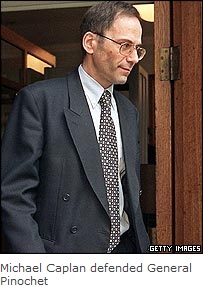
Named as suspects in Madeleine McCann's disappearance, her parents are
being advised by Michael Caplan QC, who successfully fought efforts to extradite General Pinochet from the UK.
As Kate and Gerry McCann headed back to their Leicestershire home for the first time since their daughter Madeleine disappeared,
they were visited by a man few recognised. Michael Caplan QC is one of the UK's top criminal solicitors. Joshua Rozenberg,
the Daily Telegraph's legal editor, has followed his career.
"When he went to see the McCanns last Sunday,
he went in through the front door. But it was very clear to me that none of the photographers outside recognised him. As he
was wearing a dark suit, they probably thought he was a police officer. He is not the sort of man who struts the stage and
attracts attention to himself."
Neither Mr Caplan nor Kingsley Napley, the firm in which he's a partner,
are strangers to controversy. One of the founders of the firm, Sir David Napley, was solicitor to the former Liberal leader
Jeremy Thorpe when he was tried for conspiracy to murder.

One of Mr Caplan's early cases was to represent the captain
of the dredger Bowbelle which collided with the Marchioness on the Thames in 1989, killing 51 people. Captain Henderson was
tried twice but never convicted of any wrongdoing. But it was in 1998 that Mr Caplan was really catapulted into the limelight.
The former Chilean dictator, Augusto Pinochet, was arrested in the UK on a warrant from Spain requesting his extradition to
face murder charges.
"His lawyers didn't look for someone on the same side politically as Pinochet - instead
they went for the most reliable, straight-forward, unflamboyant lawyer in London. They picked Michael Caplan," says Mr
Rozenberg.
Landmark case
The Pinochet case was always going to be colossal. Its ramifications
would be felt around the world. At its heart was the issue of whether a former head of state could be extradited to stand
trial for crimes committed whilst in power, or whether they were immune.
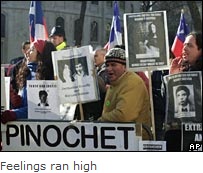
Tyrants and despots around the world would have to carefully reconsider
their travel plans if General Pinochet lost. Barrister Julian Knowles, who also acted for the General, believes that was the
"most important extradition case there's ever been and possibly ever will be".
"It was an opportunity
to make legal history and he would have been aware of those benefits for him and the firm - the financial benefits,"
says Mr Knowles.
"But this was undoubtedly a case which offered every lawyer involved an opportunity to leave
footprints, and that would've been his primary motivation."
But what were the particular skills needed
to represent General Pinochet; what strengths did Michael Caplan bring to bear?
"The approach he takes to
legal problems is to think about them from every angle much as a chess player does - how will this move impact on future moves?"
says Mr Knowles.
Limelight
But running an intensely high-profile case is a vast undertaking.
Representing the McCanns may well prove to be as huge a task. Cases like these involve far more than just preparing for court.
Another member of the Pinochet team, Clive Nicholls QC, says Mr Caplan was "concerned with dealing with Pinochet himself,
and his wife".
"He had to manage and control the Chilean part of the senator's
team," says Mr Nicholls.
"Equally he had to keep control of those who wanted to be associated - such
as Margaret Thatcher - so he kept in contact with her. He's very good at dealing with these people and keeping them at
the proper distance."
As the case progressed, anger and emotion ran high. At the centre of it all Mr Caplan
had to address the hungry press and face down the taunts of General Pinochet's political opponents. At times, as Mr Knowles
remembers, it got pretty hairy.
"The tension was intense, with a banner outside court reading 'Michael
Caplan is a torturer'. Not many solicitors had that accusation levelled against them."
But in 2000 the
then UK Home Secretary, Jack Straw, released General Pinochet from house arrest in Britain after he was declared unfit to
stand extradition proceedings.
Mr Caplan saw General Pinochet on to the plane taking him back to Santiago. Such
was the trust he'd inspired that Lady Thatcher left specific instructions that only Mr Caplan be permitted to give her
old friend an inscribed plate, once he was safely on board.
First among equals
So why
is a solicitor also a QC, a title historically the preserve of barristers? When solicitors were granted the right to appear
as advocates in the higher courts in the early 1990s, Mr Caplan was quick to qualify as what's known as a solicitor advocate.
In 2002 he was the first solicitor from a criminal law background to be made a QC. And one of the bees in his bonnet
was to ensure that, now they were on the same footing, solicitor advocates should wear the same wig and gown in court as their
barrister colleagues.
"He played a leading role in consultation with government to make it clear that parity
of dress in court is essential for justice. You might describe him as a quiet crusader. He'd never shouted from the rooftops,
but always made the point very clearly when opportunities arose," says Mark Clough, a friend and fellow solicitor QC.
Mr Caplan is a man used to winning. But even after a victory in court, this is a lawyer who really isn't one to
go out and party. Mr Clough, a long-time lunch partner, says he's "quite abstemious" and "restrained"
and is a vegetarian.
"That's his general approach to life - very measured. Not that he doesn't have
a sense of humour - he has a twinkle in his eye and a wry smile. He's a very easy, approachable person."
And this extends to how he treats his clients. "He has a gift to explain to a client why he's doing something in
a way they can understand."
McCann case
That's no doubt one of the qualities
that has appealed to the McCanns. But Mr Caplan also has particular expertise that could prove invaluable to them.
"If it's decided in Portugal they should be tried, they will want advice as to fighting extradition or returning
voluntarily," says Julian Knowles. The other area of law Mr Caplan specialises in is "mutual assistance" -
the process where one country seeks the assistance of another in a criminal investigation. "The McCanns will want to
know if the Portuguese police can turn up at their house and search it. Or can they get the English police to search it."
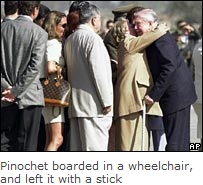
Madeleine's disappearance has been reported around the globe.
But in Chile, it's Mr Caplan, known for representing General Pinochet, who made the headlines when it was reported this
week that he's been hired for the case.
"Because Pinochet is a controversial figure, so is Michael Caplan.
People in Chile remember the main argument for the defence was his poor state of health. And the first image of Pinochet in
Chile was when he got out the plane in a wheelchair then stood up and walked," says the BBC's Andrea Ernandez in
Santiago.
"So today some people think Michael Caplan is an excellent lawyer and Madeleine's parents are
in good hands. Others who ask why they chose someone who defended Pinochet, a military ruler who was accused of crimes against
humanity."
But Mr Caplan has said that a lawyer has a duty to a client, just as a surgeon has to a patient.
Clients don't want to be judged by their lawyers. What they want is ability and a safe pair of hands. In Michael Caplan,
Kate and Gerry McCann have got just that.
|
Kevin Halligen's Appeal against
Extradition to be heard by The Supreme Court on 21 February 2012, 11 January 2012
|
Kevin Halligen's Appeal against Extradition to be
heard by The Supreme Court on 21 February 2012 The Supreme Court
|
General
|
|
CaseID
|
UKSC 2011/0180
|
|
Case name
|
R (on the application of Halligen) (Appellant) v Secretary of State
for the Home Department (Respondent)
|
|
Case stage
|
Hearing Scheduled
|
|
Date of issue
|
10 Aug 2011
|
|
Expedition requested
|
Not Applied For
|
|
Order being appealed - Date
|
21 Jun 2011
|
|
Order being appealed - Court
|
Divisional Court QBD (EW)
|
|
Devolution
|
No
|
|
Human Rights raised
|
Yes
|
|
Human Rights raised - details
|
Article 6 ECHR Declaration of Incompatibility sought
|
|
Intervener
|
No
|
|
|
Date supporting documents received |
|
Date PTA application referred to justices |
|
|
|
|
Permission granted/refused |
|
Notice of intention to proceed filed |
|
|
|
On appeal from the QBD Divisional Court (England and Wales)
Issues
What are the minimum requirements to constitute good notice of appeal for the purposes of section
108(4) of the Extradition Act 2003?
If an individual is notified by fax sent after 4:30p.m. that the Secretary
of State has decided to order his extradition, when does time begin to run for the purposes of the 14-day time limit in section
108(4) of the Extradition Act 2003?
Facts
The Appellant was arrested under a provisional arrest warrant
issued under section 73 of the Extradition Act 2003. He was remanded in custody while the Secretary of State considered whether
to order his extradition to the USA. On 22 December 2010 officials acting on behalf of the Secretary of State sent a fax to
the Appellant informing him that the Secretary of State had decided to order his extradition. It is not clear whether the
fax was sent before or after 4:30pm on that day.
Seven days later, on 29 December 2010, the Appellant's solicitors
filed a full notice of appeal in form N161 with the Administrative Court. On the same day, the Appellant also sent a handwritten
letter to the Secretary of State asking her to 'accept this letter as notice and service of my intent to appeal that order'
and stating that he had instructed solicitors and counsel for that purpose.
On 4 January 2011 the 14-day time
limit for filing and serving a notice of appeal prima facie expired. On 5 January 2011 the Appellant’s solicitors faxed
a sealed copy of the Appellant’s form N161 to the Crown Prosecution Service and posted a sealed copy of the form to
the Secretary of State.
On trial of a preliminary issue, the Divisional Court held that it did not have jurisdiction
to entertain an appeal against the Secretary of State's decision to order the Appellant's extradition since the Appellant
had failed to comply with the requirements of section 108(4) of the Extradition Act 2003. The court held that the Appellant's
handwritten letter was not a notice of appeal because it was no more than an indication that the Appellant intended to appeal.
The court also held that the 14-day time limit began to run on the day that the Appellant was informed that the Secretary
of State had ordered his extradition, regardless of what time during the day the fax notifying him of the decision was actually
sent. Accordingly, the time-limit for filing and serving a valid notice of appeal had expired on 4 January 2011 – before
the Appellant served his form N161 on the Secretary of State and the CPS.
Subject Matter catchwords for
indexing
Extradition – Appeals – Requirements of valid notice of appeal – When time begins to
run for purposes of statutory 14-day time limit
|
|
|
|
|
|
|
|
|
Appellant case date filed |
|
|
|
Secretary of State for the Home Department |
|
|
|
|
|
|
|
|
|
Respondent case date filed |
|
|
|
|
|
|
|
|
|
PTA granted by court below |
|
Statement of facts & issues and Appendix due date |
|
Statement of facts & issues and Appendix date filed |
|
|
|
|
|
|
|
Time estimate number of days |
|
|
|
|
|
|
|
|
|
|
|
|
|
|
|
|
|
|
|
|
|
|
|
The Supreme Court - Court Sittings,
Week commencing 20 Feb 2012
|
|
21 Feb 2012
Court 2
10:30
R (on the application of Halligen) (Appellant) v Secretary of State for the Home Department (Respondent)
Case ID: UKSC 2011/0180
22 Feb 2012
Court 2
10:30
R (on
the application of Halligen) (Appellant) v Secretary of State for the Home Department (Respondent)
Case ID: UKSC 2011/0180
|
Home Office response, concerning extradition
appeal by Kevin Halligen, 03 April 2012
|
|
Home Office response, concerning extradition appeal
by Kevin Halligen
Received by email, Tuesday 03 April 2012
Home Office
Direct Communications Unit
2 Marsham Street,
London
SW1P 4DF
Reference: T3523/12 & T1051/12
Dear Mr Moore,
Thank you for your e-mails of
19 January and 29 February about the extradition case of Kevin Halligen.
Mr Halligen's appeal was heard at
the Supreme Court on 21- 22 February 2012 and judgment was reserved. The Court has not yet set a date for judgment to be handed
down.
In cases such as this, where the appeal relates to whether the rules regarding the lodging and serving of
appeal papers were complied with, the person would not be automatically discharged from extradition proceedings were the Supreme
Court to rule in his/her favour. However, he/she would be able to pursue their appeal against their extradition in the High
Court.
In general terms, under the Extradition Act 2003, if a person's appeal is dismissed by the Supreme Court,
they must be extradited with 28 days. There is no further right of appeal under UK law.
Yours Sincerely
Gemma Kelly
Extradition Section
|
|
JUDGMENT: Kevin Halligen Appeal, 23 May
2012
|
JUDGMENT: Kevin Halligen Appeal Supreme Court (PDF file)
JUDGMENT
Lukaszewski (Appellant) v The District Court in Torun, Poland (Respondent)
Pomiechowski
(Appellant) v District Court of Legunica 59-220 Poland (Respondent)
Rozanski (Appellant) v Regional Court 3 Penal Department
Poland (Respondent)
R (on the application of Halligen) (Appellant) v Secretary of State for the Home Department (Respondent)
Easter Term
[2012] UKSC 20
On appeal from: [2011] EWHC 2060 Admin;
[2011] EWHC 1584 Admin
before
Lord Phillips, President
Lady Hale
Lord Mance
Lord Kerr
Lord Wilson
JUDGMENT
GIVEN ON 23 May 2012
Heard on 21 and 22 February 2012
|
Kevin Halligen, 23rd May 2012 |
Kevin Halligen 23rd May 2012 Carter Moore Solicitors
by CARTER MOORE
MAY 23, 2012
Carter
Moore were today a party to a landmark ruling on extradition proceedings in the Supreme Court. In the case of R v Kevin Halligen,
Carter Moore successfully argued that Article 6(1) of the European Convention on Human Rights applies to extradition proceedings
and our client was thus denied a fair trial by the High Court's refusal to accept an appeal lodged a day late by his previous
solicitors.
Mr Halligen's case will now be referred back to the High Court where we will argue substantive
grounds of appeal against the order for his extradition to the United States.
|
Kevin Halligen – The Times Law Report, 07 June 2012 |
Kevin Halligen – The Times Law Report Carter Moore Solicitors
by CARTER MOORE
JUNE 7, 2012
Our landmark ruling
in extradition proceedings has been reported in full by The Times Law Reports.
Read the full story here:
Supreme Court
Published June 7, 2012
Pomiechowski v District Court of Legunica 59-220
Poland
Lukaszewski v District Court in Torun, Poland
Rozanski v Regional Court 3 Penal Department, Poland
R (Halligen) v Secretary of State for the Home Department
Before Lord Phillips of Worth Matravers,
Baroness Hale of Richmond, Lord Mance, Lord Kerr of Tonaghmore and Lord Wilson
Judgment May 23, 2012
If
an irregularity in a notice of appeal against an extradition order was curable by amendment, and the circumstances merited
that, the court was entitled to allow the amendment and hear the appeal.
A British citizen against whom an extradition
order was made was entitled to a fair determination before a court of the interference with his common law right to enter
and remain within the United Kingdom as and when he pleased. Statutory provisions which impaired the right to appeal against
an extradition order by imposing strict and inflexible time limits for filing a notice of appeal should, in the case of a
British citizen, be read with the qualification that the court had a discretion in exceptional circumstances to extend time
and hear the appeal.
The Supreme Court so held, allowing the appeals of Radomil Pomiechowski and Rafal Lukaszewski
from a decision of the Divisional Court (Lord Justice Laws and Mr Justice Kenneth Parker) ([2012] 1 WLR 391), of Robert Rozanski
from a decision of Lord Justice Moore-Bick ([2011] EWHC 2060 (Admin)) and of Kevin Richard Halligen from a decision of the
Divisional Court (Lord Justice Laws and Mr Justice Stadlen) ([2011] EWHC 1584 (Admin)).
The first three appellants
were Polish citizens against whom European arrest warrants had been issued by Polish courts. Each had been arrested and brought
before the magistrates' court where extradition was ordered. Each purported to serve a notice of appeal within the required
period of seven days specified by the Extradition Act 2003 by serving the front page of the notice of appeal on the judicial
authority. The Divisional Court held that their appeals had not been served in time since the documents did not identify the
appellant, the decision appealed against and the basis on which the appeal was sought to be presented.
The fourth
appellant was a British citizen whose extradition was sought to the United States of America to face criminal charges. The
Home Secretary ordered his extradition and sent him a letter informing him of his right under section 108 of the Act to appeal
within 14 days to the High Court and pointing out explicitly that "any papers filed at the High Court must also be served
upon the Home Office and the Crown Prosecution Service". However, his solicitors sent the notice of appeal to the Home
Office and the Crown Prosecution Service after the expiry of the 14 day period. The Divisional Court ruled that it had no
jurisdiction to hear his appeal.
Mr Edward Fitzgerald, QC, Mr Ben Watson and Ms
Amelia Nice for the first two appellants; Mr Hugo Keith, QC and Mr Gary
Pons for the third appellant; Mr William Clegg, QC, Mr Stephen Vullo and Mr
David Patience for the fourth appellant;Mr John Hardy, QC and Mr Ben Lloyd for
the respondent judicial authorities, and for the Government of the United States of America as interested party; Ms
Clair Dobbin for the secretary of state.
LORD MANCE (with whom Lord Phillips, Lord Kerr and Lord
Wilson agreed) said that the irregularity involved in the first three cases was capable of cure and on the facts certainly
merited that. The Crown Prosecution Service could have no difficulty in identifying the decision being appealed, and it would
be disproportionate if the practice followed by the court and the prison legal services should lead to those appellants losing
any right of appeal.
In the fourth case no notice of appeal had been given within the permitted period, and on
its face an appeal was impermissible.
The appellants also relied on article 5(4) of the European Convention on
Human Rights which stated that everyone "who is deprived of his liberty by arrest or detention shall be entitled to take
proceedings by which the lawfulness of his detention shall be decided speedily by a court".
The difficulty
which the appellants faced in relying on article 5(4) was that their grievance related to the extradition decision, rather
than the fact, incidental to that decision, that they had been remanded in custody pending extradition. The European Court
of Human Rights in Strasbourg drew a careful distinction between challenges to detention and to the underlying decision to
remove an alien from the jurisdiction. The appellants were not entitled to a judicial decision under article 5(4).
The Strasbourg court and commission had also stood firm against any suggestion that extradition as such involved the determination
of any criminal charge or entitled the person affected to the procedural guarantees provided in the determination of such
a charge under article 6 of the Convention. The cases emphasised that proceedings for the extradition of aliens did not involve
the determination of any civil rights within the meaning of article 6(1).
That underlined a potential difference
in that respect between aliens and citizens. It was a principle of international law that a state was precluded from refusing
its own nationals the right of entry or residence. That principle was the necessary corollary of a state’s right to
refuse aliens permission to enter or stay in its territory.
The fourth appellant, as a British citizen, enjoyed
a common law right to enter and remain in the UK as and when he pleased. Did extradition proceedings under the 2003 Act, in
that it might affect his freedom to remain in the UK at least for the duration of American criminal proceedings, involve the
determination of that civil right?
The Act had the authority of Parliament and to that extent his right to remain
in the UK was potentially qualified. But under the Act it was only through extradition proceedings that the right could be
affected and suspended for the period of any American proceedings and sentence. The extradition proceedings determined whether
he might continue to enjoy his common law right for whatever proved to be the relevant period.
A claim to extradite
him did not involve the determination of a criminal charge, and he was not entitled to any full process of examination of
his guilt or innocence, or to the procedural guarantees which would attend that. But he was entitled to a fair determination
as to his common law right to remain within the jurisdiction.
There was no reason to believe that Parliament either
foresaw or intended the potential injustice which could result from absolute and inflexible time limits for appeals.
In the case of a citizen of the UK the statutory provisions concerning appeals could and should all be read subject to the
qualification that the court must have a discretion in exceptional circumstances to extend time for filing and service, where
statutory provisions would otherwise operate to prevent an appeal in a manner conflicting with a proper right of access to
an appeal process held to exist under article 6(1).
Lady Hale delivered a concurring judgment.
Solicitors: Kaim
Todner Solicitors Ltd; Dalton Holmes Gray; Carter Moore; Crown Prosecution Service, Special Crime Division Extradition Unit and Appeals
Unit; Treasury Solicitor.
|
Fraud suspect Kevin Richard Halligen
allegedly posed as a spy and cheated the elite on both sides of the Atlantic, 10 June 2012
|
Fraud suspect Kevin Richard Halligen allegedly posed
as a spy and cheated the elite on both sides of the Atlantic The Washington Post

Obtained by The Washington Post - Kevin Richard
Halligen, who is imprisoned in London, fighting extradition to the United States, where he faces felony fraud charges stemming
from his days of extravagant living in Washington high society.
By Kevin Sullivan, Published:
June 10
Some people knew him as Kevin. He told others he was Richard. Everyone could see he had money
to burn, and most people thought he was a British spy. But nobody in Washington really knew Kevin Richard Halligen, not even
the woman he pretended to marry.
Halligen now sits in a London prison, fighting extradition to the United States,
where he faces felony fraud charges stemming from his days of extravagant living in Washington high society.
For
about three years, until 2008, Halligen spent hundreds of thousands of dollars living large in Washington. He stayed in a
Willard Hotel suite for months at a time and drank the days away at pricey Georgetown restaurants. He traveled everywhere
in a chauffeur-driven Lincoln Town Car, set up high-tech offices in Herndon and bought a grand home in Great Falls.
Smart, charming and favoring black turtlenecks and sunglasses, Halligen told everyone that he was a spy, or a former spy,
or connected to spies. He told friends that he was under such deep cover that he took over his fiancee's place as a "safe
house."
Virtually all of it, it turns out, was fabricated or exaggerated, according to associates who have
since investigated his background. But with amazing ease and a perfect British accent, the diminutive Halligen schmoozed his
way into Washington's intelligence elite — Pentagon officials, influential lawyers and lobbyists, former CIA operatives.
And he took their money.
He set up shop as a corporate security consultant, offering his dubious "operational
experience" in intelligence to solve delicate problems for customers working in dangerous places.
In a capital
with a long history of spies, foreigners with shadowy backgrounds, big talkers and charlatans, Halligen didn't set off
any alarm bells at first, according to former associates. But that changed when they concluded that Halligen was taking money
and not doing the work he promised.
The U.S. government obtained an indictment against him in 2009 on criminal
charges of bilking a client out of $2.1 million, and judges in the District and Virginia have ordered him to pay $6.5 million
to former partners who claim he fleeced them.
Halligen, through his London lawyer, declined to comment as he fights
extradition to the United States in British courts.
But in dozens of interviews in Washington and London, those
who knew Halligen described how he created a trail of creditors, from lawyers to landlords to housekeepers. And they said
he left a group of Washington insiders wondering how one charming and audacious hustler managed to seduce them all.
'I was duped'
Halligen fooled London before he fooled Washington.
"I was duped,"
said John Holmes, a retired British army general who was head of the British military's special forces.
Holmes
said he met Halligen in 2002, when Halligen took an IT job at a private security consulting firm where Holmes was working
after his military retirement.
Holmes, in an interview in his London office, said he knew Halligen was never a
member of any intelligence service. But he worked on the periphery of that world as an engineer for companies that provided
technical support — designing batteries, for example — to the British government and military.
Holmes
was impressed with Halligen's smarts and entrepreneurial spirit, he said, so he helped him start his own firm, Red Defence
International. Holmes said that over time he realized that Halligen was grossly exaggerating his background to clients and
others and that he had an uncanny ability to keep his stories straight.
"He had an intellect that would instinctively
allow him to decide what he would say to people and what he wouldn’t say," Holmes said.
Other friends
said Halligen had a habit of hearing spy stories and then repeating them later as tales of his own bravery. One friend said
Halligen loved to show off a metal cigarette lighter with an inscription thanking him for helping in a secret rescue of hostages
in Colombia.
"A real spy doesn't do that," said the friend, who asked not to be named.
Halligen's
taste for luxury was also getting him into trouble. Scarlett Guess, Halligen's landlord in London, said Halligen rented
three floors of her building for close to $20,000 a month, but paid only sporadically.
At the same time, his corporate
bank statements, contained in court records in Washington, show that he was spending tens of thousands of dollars at such
places as the five-star Stafford London Hotel and Les Ambassadeurs Club, a private casino where membership costs about $40,000
a year.
Before Holmes noticed the increasing warning signs, he said, he backed Halligen's application to join
the Special Forces Club in central London, an exclusive private club for people with links to British intelligence.
That membership helped Halligen immensely as he set his sights on an ultra-lucrative security consultant mecca: Washington.
A high-level network
When Halligen breezed into Washington about 2005, one of his first
calls, according to associates, was to Patton Boggs, the heavyweight law firm. He hired the firm to help set up his new U.S.
business, Oakley International, which offered risk analysis and security advice to corporate customers.
A key contact
at Patton Boggs was lobbyist John C. Garrett, a retired U.S. Marine colonel who serves as the firm’s senior defense
policy adviser. Garrett declined to comment for this article, saying Patton Boggs does not discuss former clients.
Halligen used each new contact to methodically build up a high-level network. Garrett introduced Halligen to a number of
key Washington establishment figures, including Noel Koch, who was a White House aide under President Richard M. Nixon and
whom President Obama appointed deputy undersecretary of defense.
"If John Garrett was vouching for him, that
was good enough for me," Koch said.
Koch recalled getting to know Halligen over boozy lunches at Ristorante
La Perla on Pennsylvania Avenue NW.
Shown a photo of Halligen, who, 5-foot-6 and clean-cut, looks like a slightly
elfin Boy Scout, La Perla owner Vittorio Testa recalled that he came in nearly every day. Testa said Halligen would sit on
the outdoor patio smoking cigarettes and drinking heavily, often arriving at 11 a.m. and not leaving until 4.
"A
very elegant man, always good manners," Testa said.
Koch said he was amazed by Halligen's lunchtime drinking.
"He'd say, 'Let's have martinis,' and I'd have a martini, as would he," Koch said. "Then
we had another one, then he'd want a bottle of wine. We became fast friends over all those martinis."
Koch
was running a private security consulting company, and at one of their lunches, Halligen said he wanted to subscribe to his
firm's newsletter. Koch said that would cost $15,000, and he said Halligen made an extravagant show of overpaying.
"He wrote me a check for $20,000," Koch said, "right there at the table."
In the fall
of 2006, Halligen still had money coming in from Red Defence in London, as well as his growing Washington business. But a
big break came that September when two executives from a Dutch multinational firm, Trafigura, were arrested in Ivory Coast,
accused of illegally dumping toxic waste.
Trafigura hired Halligen to help win release of the executives. Halligen
got a large monthly retainer, though it's unclear exactly what work he did for the money or how much he received. Friends
said it ran into the millions of dollars.
A Trafigura spokesman declined to comment. The company eventually paid
$198 million to Ivory Coast officials. The executives were released in February 2007, and payments to Halligen stopped.
But up to that point, money was pouring into Halligen's corporate account, and he was spending it just as fast.
Halligen bought a $1.7 million house with a swimming pool in Great Falls. (The indictment charges that he bought the
house the day after Trafigura transferred $2.1 million to him to cover his expenses.)
Halligen was already
living in a $6,800-a-month rented house in Georgetown, on N Street near Wisconsin Avenue NW, and yet, at the same time, he
was often staying at the Willard.
He was paying a driver about $6,000 a month, usually keeping him and the Lincoln
Town Car for 15 hours a day. He dropped hundreds of dollars almost daily at restaurants such as La Perla, Cafe Milano, Martin's
Tavern, Neyla or Shelly’s Back Room, according to his corporate bank statements at the time.
"We used
to call him James Bond," said Robert P. Materazzi, owner of Shelly's, a downtown D.C. restaurant and cigar bar. Materazzi
said that Halligen was "secretive" about his business but that he was a gregarious personality and extravagant tipper
who always sat in the same table near the front of the bar, drinking expensive red wine and smoking.
Meda Mladek,
Halligen's landlord on N Street, said Halligen did thousands of dollars worth of damage and unauthorized — and shoddy
— construction at her house.
"He pretended to work for the CIA," Mladek said. "He said he
had to have a room that was totally secure, so he had to make new walls, a new ceiling, special doors."
"He
was quite elegant," she said. "But I had problems, problems, problems."
The show wedding
Amid it all, Halligen still found time for romance.
Friends said he met Maria Dybczak, a Commerce
Department lawyer with big, dark eyes and a brilliant smile, and started courting her lavishly. He bought her a huge diamond
ring, a Prada handbag and a pair of purebred Hungarian vizsla puppies, friends said.
Tereza McGuinn, a D.C. makeup
artist who was close to Dybczak, said Halligen told Dybczak that he was a British agent. She said that he took Dybczak one
weekend for a course on high-performance defensive driving and that he taught her how to handle a gun.
"I
thought there was something really wrong about it," McGuinn said in an interview. McGuinn said that she didn't believe
Halligen's spy background but that Dybczak seemed blinded by his charm and attention.
In a brief interview
at her D.C. home, Dybczak said she and her family had been "devastated" by Halligen but declined to say more.
On the last Friday in April 2007, she wore a white wedding gown at a spectacular evening ceremony at the Evermay estate
in Georgetown.
Dybczak's family, who friends said paid for most of the wedding, came to town from Alabama.
Halligen flew over at least a dozen friends from London, first-class, and put them up in suites at the Hay-Adams Hotel. Washington
guests included Koch and Garrett, the Patton Boggs lobbyist, who was Halligen's best man.
Security men with
earpieces watched over the high-powered crowd of about 100 people, and guests were met by a sign in calligraphy telling them
that no cameras or phones were allowed.
Wedding photographer Clay Blackmore said Dybczak asked him to shoot film
only — no digital images.
"She told me, 'Richard is very connected, and anybody wearing a pin on
their lapel can't be photographed,'" Blackmore said. "She told me 'Richard is top-level and he's
a secret agent' or something like that. I just bought into it like everybody else did."
McGuinn said Dybczak
and Halligen went "hog-wild" on the wedding, with a huge fireworks display and an extravagant dinner of lobster
and lamb in the ballroom, where dinner chairs were covered with thousands of dollars' worth of silk pillows.
On Evermay's grand back terrace, Halligen and Dybczak stood on a carpet of rose petals as the minister read vows from
a leather-bound notebook and pronounced them husband and wife.
What the guests didn't know was that the minister
was Harry Winter, a professional actor from Arlington's Signature Theatre, who was hired by the couple to preside over
an elaborate fake.
According to friends, Halligen told Dybczak just before the wedding — when guests had
been invited and arrangements made — that because he was involved in undercover intelligence operations, he could not
sign any public documents — including a marriage license.
It's unclear whether Dybczak believed him.
But rather than cancel the ceremony, she helped him arrange the show wedding. Winter said she paid him $300 in cash.
"It was a wonderful, beautiful service," Winter said in an interview. "Nobody knew it wasn't real."
Nor did they know that Halligen was already married.
British records show that Halligen had been married
16 years earlier to a woman named Jennifer Darvill, and he was still married to her at the time of the Evermay wedding.
"He told me plenty of lies," said Darvill, reached in England.
Darvill said she met Halligen
in 1988, and in all the time she knew him, "I was not aware that he had any involvement with security, military or intelligence."
She said he left her in 1998 to have an affair with another woman, leaving behind a "stack of unpaid bills"
that she paid by selling antiques inherited from her father.
Things fall apart
After
the Evermay wedding, Halligen was riding high. He spent the next year building his business. By early 2008, court records
show, London lawyer Mark Aspinall — who was his connection on the Trafigura case — had invested $750,000 in Halligen's
Oakley International.
Halligen also received an enormous boost from the internationally known case of Madeleine
McCann, a 3-year-old British girl who disappeared while on vacation with her family in Portugal.
In the spring
of 2008, the Find Madeleine Fund hired Oakley International on a six-month contract worth just under $1 million. Halligen
was supposed to use high-tech surveillance and satellite imagery and conduct interviews to help find the girl.
His
bank accounts ballooned with regular deposits of $200,000 or more over the next few months. But Halligen's carefully constructed
life was starting to unravel.
Clarence Mitchell, a spokesman for the Find Madeleine Fund, said fund officials began
questioning whether Halligen's work was worth those large payments, and they terminated his contract in August 2008.
Aspinall, meanwhile, was becoming increasingly suspicious of what became of his $750,000 investment, and court records
state that he made at least two trips to Washington to question Halligen.
By September 2008, the McCann contract
was canceled, Halligen's debts were mounting and his reputation was sinking. His relationship with Dybczak was over, and
he was preparing his exit from Washington.
His corporate bank records show that in September, October and November
2008, Halligen drained $800,000 from his D.C. account and wired much of that overseas. He sold the Great Falls house. By November,
his Washington bank account was overdrawn by $1,400. And Halligen was gone.
His former friends started looking
for him and investigating his finances and background. They contacted the FBI. And they also started filing civil suits.
Aspinall filed suit in Washington to recover his investment in Oakley, and a judge ordered Halligen to pay back $871,000.
Halligen was also sued by another Washington insider, Andre Hollis, a former deputy assistant secretary of defense
for counternarcotics, who had given a toast at the Evermay wedding.
Hollis, a lawyer who once worked as legal counsel
to the House of Representatives and as senior adviser to Afghanistan's Ministry of Counter Narcotics, sued Halligen in
Fairfax Country Circuit Court for $2.35 million.
Hollis alleged that Halligen hired him as chief executive of Oakley
International and that Hollis bought an ownership stake in the company. He said that the investment turned out to be worthless
and that Halligen drained the company's accounts. A judge ordered Halligen to pay Hollis more than $5.7 million in damages.
As investigators pursued Halligen, they found yet another surprise. They unearthed documents suggesting that the silver-tongued
Brit had actually been born in Ireland.
In November 2009, after a year on the run, Halligen was jailed after being
arrested at a luxury hotel in Oxford, England. The bartender there recalled that Halligen had been staying at the hotel for
weeks under an alias, with a girlfriend, running up huge bar tabs, buying drinks for the staff and spinning tales of life
as a spy.
Staff researcher Jennifer Jenkins and special correspondent Karla Adam in London contributed to this
report.
------------------------
Halligen documents The Washington Post
Kevin Richard Halligen was a smooth-talking, hard-drinking man with a posh British accent who arrived in Washington
around 2005 and set up a security consulting business, claiming to have "operational experience" in the world of
British intelligence. Now Halligen, 50, is sitting in a London prison awaiting extradition to the United States after being
indicted on felony fraud charges in U.S. District Court in Washington.
Birth certificate
This birth certificate
shows that Kevin Patrick Halligan (spelled with an "a") was born in Dublin on July 14, 1961. His father's name
is different from the one listed on Halligen's 1991 marriage certificate. This birth certificate was provided by a private
investigator trying to find Halligen after he left Washington in November 2008 and before his arrest in England in November
2009. The investigator said the certificate was given to him by Irish private investigator he hired to trace Halligen's
roots. It is impossible to be 100 percent certain that this certificate belongs to Halligen. But record checks in Kent, England,
where Halligen told his former wife and others that he was born, show no record of his birth. The Post sent Halligen a photocopy
of this certificate via his London lawyer, asking whether it was his. He did not respond.
Passport
states that he is an Irish citizen
born July 14, 1961, in Dublin. This passport copy was obtained by a private investigator trying to find Halligen after he
left Washington in November 2008 and before his arrest in England in November 2009.
Marriage certificate
Halligen's marriage
certificate showing that he married Jennifer Patricia Darvill on March 26, 1991, in Hampshire, England. Although Halligen
regularly said he was born on July 14, 1961, his age is listed on the marriage certificate as 32 rather than 29. This certificate
is public record and was obtained by The Post from the Hampshire County Council.
Divorce certificate
This divorce decree
shows that Halligen's marriage to Jennifer Darvill was not dissolved until Sept. 23, 2010. Darvill said that Halligen
left her in 1998 and that she did not know his whereabouts until 2010, when she heard that he had been arrested and was in
London's Wandsworth Prison. She said she had divorce papers served on him there. This decree is public record and was
obtained by The Post from Darvill and then verified by the Oxford County Court.
Special Forces Club application
Halligen's
application for membership in the Special Forces Club in Knightsbridge, London. The club is an exclusive group of people with
links to the British intelligence community. Halligen's membership in the club helped him establish himself in Washington
as a person with close ties to the British intelligence world. Two former British military officers who sponsored Halligen's
membership later said they felt duped by Halligen, whose connection to British intelligence was peripheral at best. This application
was provided by a private investigator trying to find Halligen after he left Washington in November 2008 and before his arrest
in England in November 2009.
DOD ID card
A Common Access Card (CAC),
with Halligen's name and photo, issued by the U.S. Department of Defense. These smart cards, with embedded computer chips,
are commonly used as identification for active-duty military personnel and nonmilitary contractors. They provide access to
certain military computers and buildings, depending on the security level authorized in the chip. A photocopy of this card
was obtained by a private investigator trying to find Halligen after he left Washington in November 2008 and before his arrest
in England in November 2009. Pentagon officials declined to comment on the card’s authenticity or on whether or why
it was issued to Halligen. The Post sent a photocopy of the card to Halligen, through his London lawyer, asking whether it
was his. He did not respond.
Wedding menu
The menu for the wedding
of Richard Halligen and Maria Dybczak designed by Margaret Cunningham of the Cunningham Group won an ADDY award from the American
Advertising Federation. The Cunningham Group is an advertising and public relations company based in Montgomery, Ala. Halligen
and Dybczak celebrated a wedding April 27, 2007, at the Evermay estate in Washington. At the time of the Evermay wedding,
an elaborate hoax in which the minister was actually a professional actor, Halligen was still married to Jennifer Darvill.
(Cunningham Group)
|
Alleged Irish fraudster who helped hunt
for Madeline McCann handed over to FBI, 17 December 2012
|
Alleged Irish fraudster who helped hunt for Madeline
McCann handed over to FBI Irish Independent
By Katie Hodge
Monday December 17 2012
An alleged fraudster who
set up a firm to hunt for Madeleine McCann is being handed to the FBI over a £1.3m (€1.6m) con.
Kevin
Halligen's Washington-based company received around £300,000 from backers of Kate and Gerry McCann but his contract
was terminated early and he was later accused of fraud in the US.
The Irish national, 51, lost an appeal against
extradition earlier this month and will be sent to the US to face justice "as soon as possible", the Home Office
said.
US officials believe he tried to cheat a London law firm out of $2.1m, claiming he needed funds to secure
the release of two business executives from Dutch company Trafigura, who were arrested in Ivory Coast.
He is said
to have spent the cash on a lavish lifestyle, including on a mansion in Virginia, US.
Mr Halligen was arrested
at Old Bank hotel in Oxford in 2009 where he was staying for several months under an assumed name and had run up a £5,000
bill.
Police swooped after a hotel manager recognised him as a wanted man.
The McCanns used his firm
Oakley International for around six months to look for their missing daughter.
The £500,000 contract saw
the firm hire private detectives, set up a hotline and process information.
But the McCanns terminated the arrangement
without paying the full fees because Halligen, from Surrey, apparently failed to fulfil certain agreements.
He
faces no formal allegations in relation to that episode.
A Home Office spokesman said: "Kevin Richard Halligen
is wanted in the US where he is accused of fraud.
"His appeal against extradition to the US was dismissed
by the High Court on December 5 and arrangements are being made to extradite him as soon as possible."
|
Madeleine 'detective' from U.S
accused of swindling £30k [sic] from search fund extradited, 15 December 2012
|
Madeleine 'detective' from U.S accused of swindling
£30k from search fund extradited Daily Mail
- Kevin Halligen will be flown to Washington on Thursday after losing his High Court appeal
- In
2008, Halligen's company signed a contract to help find Maddie, who went missing a year earlier
By MAIL ON SUNDAY REPORTER
PUBLISHED: 23:17, 15 December 2012 | UPDATED:
10:24, 17 December 2012

A self-styled security consultant accused of swindling the Madeleine
McCann fund out of £300,000 is to be extradited to the United States this week to face fraud charges.
Kevin
Halligen, 53, lost his final appeal before the High Court in London on Friday and will be flown to Washington on Thursday
to face allegations of cheating former business partners out of £1.2 million.
In 2008, Halligen's
company Oakley International signed a contract to help find Maddie, who went missing in Portugal a year earlier.
He said he would use his MI6 and CIA contacts and high-tech surveillance equipment in the hunt but over six months he came
up with no new leads.
He was arrested in Oxford in November 2009 after fleeing Washington DC when the US government
began seeking an indictment against him for 'wire fraud and money laundering'.
US Courts have also ordered
Halligen to pay about £4 million to other former business partners who claim he fleeced them.
Halligen
had been fighting extradition since his arrest.

|
|
|
|
|
|
With thanks
to Nigel at
McCann Files
|
|
 |
|
|
|
|






